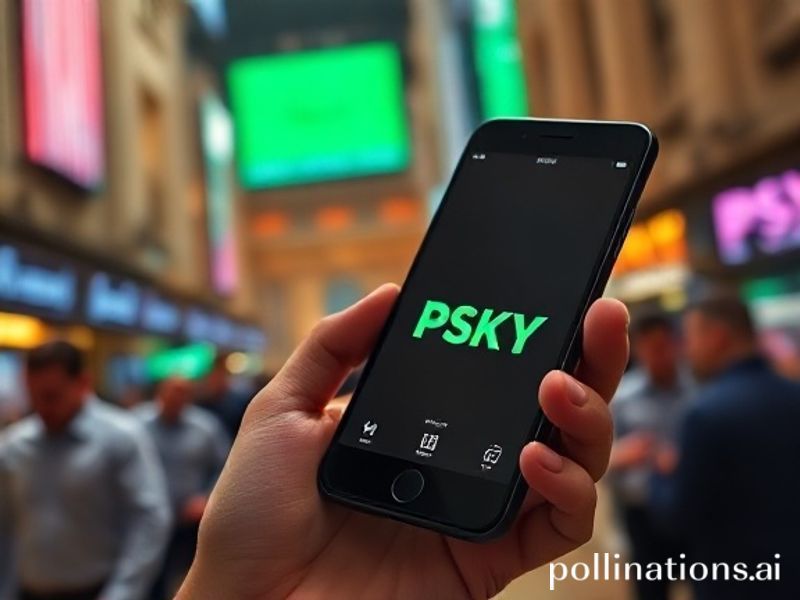From Copenhagen to Cloud Nine: How PSKY Became the World’s Most Expensive Skyward Selfie Stick
Tokyo’s dawn had barely broken when the first margin call hit. In a glass tower overlooking Shibuya Crossing, a bleary-eyed analyst watched PSKY—an obscure satellite-imagery outfit headquartered in a repurposed Copenhagen church—spike 42 % on the Nikkei before his espresso finished dripping. By the time London opened, the same stock had already been shorted, memed, and compared (unfavorably) to both tulip bulbs and Weimar bread. When New York finally staggered in, hung-over from another night of AI earnings confessions, PSKY was up another 67 % on no new fundamentals whatsoever, proving once again that the global market is less a rational allocator of capital and more a planetary-scale mood ring dipped in espresso and cocaine.
To the uninitiated, PSKY is simply a middling Earth-observation company whose name sounds like a vaporware crypto wallet. Its satellites—each roughly the size of a dorm-room fridge—beam down grainy JPEGs of container ports, cornfields, and the occasional clandestine missile silo. The images are then fed to hedge funds, NGOs, and that one guy in Manila who claims he can predict pork-belly futures by counting delivery trucks from space. Revenue last year: €73 million. Market cap as of 9:47 a.m. GMT: €47 billion, or roughly the GDP of Slovenia. If that strikes you as proportionate, congratulations—you’re ready for your own SPAC.
What turned PSKY into the international Rorschach test du jour was a single PowerPoint slide leaked by an intern who has since changed his name and relocated to Montevideo. The slide hinted—no data, just vibes—that PSKY’s next constellation might be able to “hypothetically” detect methane leaks in real time, thereby allowing traders to price carbon offsets before regulators finish their second bottle of Bordeaux. Within minutes, ESG funds from Oslo to Nairobi were elbowing each other to virtue-signal their way into the trade, while petrostates quietly bought puts the way one stocks up on canned beans before a coup.
The geopolitical angle, never far behind when anything leaves the atmosphere, arrived shortly after lunch in Brussels. EU bureaucrats, still dizzy from trying to sanction Russian oil without sanctioning themselves, floated the idea that PSKY could become the “digital conscience” of Article 6 carbon markets. Translation: we’ll pay you to tattle on Chinese coal plants from 600 km up, then act shocked on television. Beijing responded by reminding everyone it already owns half the lithium required to build the satellites’ batteries, effectively turning PSKY into a glorified subscription service for the Middle Kingdom. Cue another 12 % gap up.
Meanwhile, in the Global South, where satellites are usually something that fall on your village rather than help it, PSKY’s rally is being watched with the weary amusement reserved for all First-World fetishes. Kenyan agritech founders note—correctly—that a $20 weather app already tells farmers when to plant, but concede that venture capital prefers shinier objects. Brazilian fintech bros joke that if PSKY ever photographs the Amazon’s remaining canopy, the image will be minted as an NFT and sold back to them at a 30 % markup. Everyone laughs, because the alternative is crying into a deforested horizon.
By the closing bell in New York—signified not by a bell anymore but by a server in Secaucus politely clearing its throat—PSKY had round-tripped half its gains, leaving retail investors in Jakarta, Warsaw, and Akron clutching leveraged ETFs like rosaries. Analysts blamed “profit-taking,” which is Latin for “finding a greater fool before the music stops.” The greater fools, for their part, blamed “market manipulation,” which is Greek for “nobody forced you to YOLO your rent money into a Danish space church.”
As night circles the globe and the satellite named after a minor Norse god glides silently over the Pacific, one truth remains: somewhere, a pension fund in Reykjavík just doubled its allocation to PSKY because a consultant used the word “optionality.” The rest of us can only watch, half in envy and half in horror, as the same planet that perfected famine and TikTok dances figures out how to monetize the view from space. The market may or may not be efficient, but it is, undeniably, efficient at reminding us that human nature is the only truly renewable resource.







